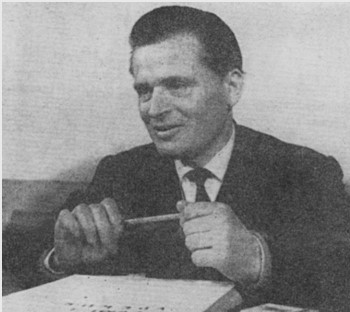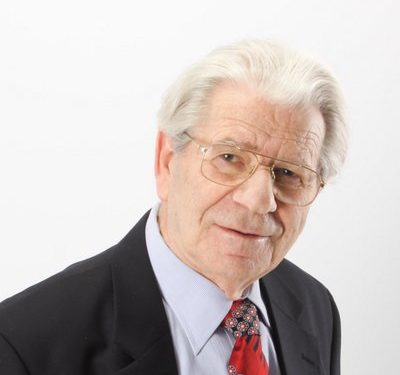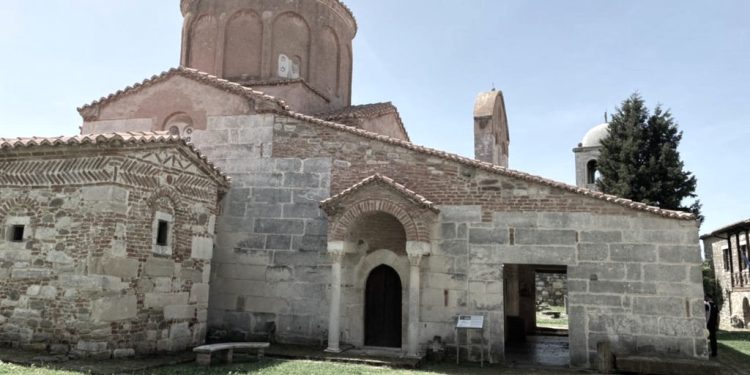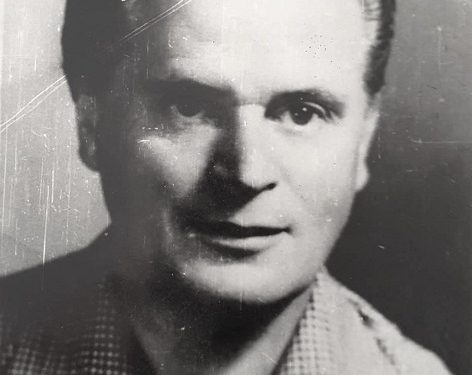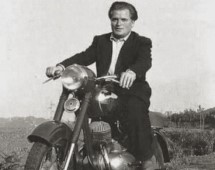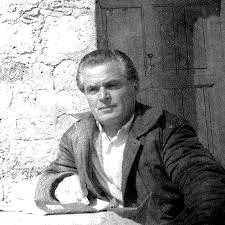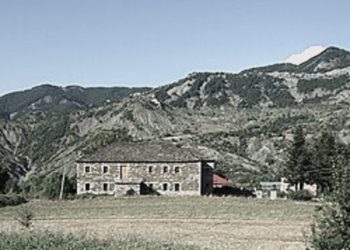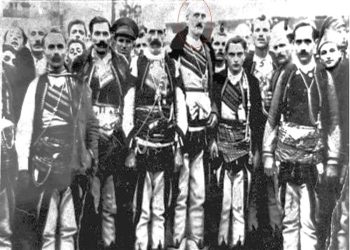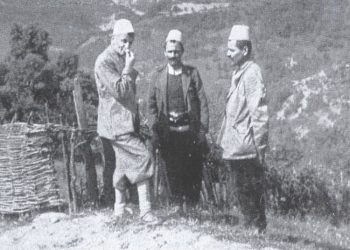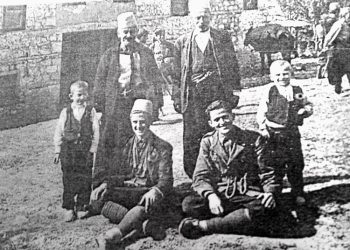By ARISTOTLE MICI
(Remembering the writer Jakov Xoxa)
Memorie.al / for the first time, I read the name of Jakov Xoxa in the book “Gramatika” by Kristaq Cipo, when I was in the first unique class. In that book, Professor Cipo had illustrated a small fragment from Jakov Xoxa’s novels, and exactly in that book, the river of our city Gjanica was described. In the unique third grade, which corresponds to the third grade today, we found again the name of Jakov in the anthology book, where the novella “Kurorat e Masar Beut” was included. And in 1953, I had the chance to see Jakov in person and listen to him, when he came to the gymnasium of Shkodra, together with the writer Kolë Jakova. At that time, he had just returned from Bulgaria and was the rector of the “Tribune of young writers”, as an internal page of “Voice of Youth”. At the meeting of the literary circle, he raised the need for cooperation with this literary site.
To my delight, two years later, I would have Jakov as the teacher of the “Theory of Literature” course at the Pedagogical Institute (the University of Tirana was not yet established at that time).
In the interval of a consultation, I found the moment to meet him and talk a little. Jakov liked the short conversation and told me to continue the conversation even after the consultation.
At the end of the lecture, we met and traveled from the Institute, which (at that time was located in front of the Maternity Hospital) to “Skënderbej Square”. He asked me about the family and, when he found out about the conflict between our tribe and the Vrionas, he became very curious, and told me that he would come to visit the village, in Saint Peter, Fier.
It was an August afternoon in 1955. I was studying the “History of Old Albanian Literature”, compiled by Ziadin Kodra, when my cousins’ children came to my window of the ground room and told me that a man had come from Tirana and looking for you I went outside and it occurred to me that it must be Jacob. And indeed he was. He was waiting for me, holding a bicycle.
– After finding a fast horse – I told him.
– It’s Lili Bela’s bike, – he answered, – he did me an honor.
It was still hot in August, so my mother brought out two wooden benches for us and we sat in the shade of the willow tree in the yard. Mother brought out with a tray two glasses of fresh buttermilk shaker.
Then mother lit a fire in the brick hearth outside the house, under the shade of the willow tree, and prepared fried eggs with white cheese. I remember that, when the mother was boiling the coffee, Jakov turned to her and said: – “Do you remember the migration of the tribe from Griza”?
– “More than displacement, it was expulsion, it expelled us mercilessly”.
– “How did it happen? For what reason”?
– “Oh! Yes, Çaçi, my husband, who mixed them with the fans, knew Fan Noli from America. One by one mentioned Fan Noli. He also connected with those who were with the “Union”. And then, when Fan Noli left, the bey raised his voice and said: “Better one less farmer, than one more headstrong”.
– “And you ran away immediately.” – “No, no, immediately. We stayed as long as we stayed, what were we going to do? It was the time of the Beylers. They made the law. When we saw that we could not budge, the bey sent the Qehallars and other armed men. They put ladders, climbed up and removed our roof. Then what should we do? We loaded the carts and went to Fier. A friend of Çaç, Tonç Bufi, opened his yard and house to us”. When the mother brought the coffee pot and started filling the cups, Jakov asked her again:
– “But why did you come and settle right here in St. Peter”?!
“We came here because Çaçi had been known in America, when he was on the curves with three friends. They were engaged in trade and had formed a kind of partnership. They, the partners, had told Çaç: You don’t have grown-up children, but you have a lot of nephews who want work. To help you, let’s make a deal.
In Saint Peter, we have found a large two-story house. Home wants people, and you want home. Settle there and we’ll make a farm, for an alla American farming. We will raise horses and pigs, because the market wants them. We will give them goods in return, half. Our heads, the production in the middle”.
This mind was liked and the tribe decided to settle here. However, this effort of the joint traders, to earn as much as possible and spend as little as possible, did not turn out well. Then they saw fit to break the contract, take their living thing and we were left with a finger in our mouth. After a couple of hours, when the heat dropped, I took Jakov out to get to know the village a little.
At first, I dug it in the church of Saint Peter, which gave its name to the village. We didn’t find the butler to open the door for us. I wanted Jakov to recognize the church, because it was old, made of stones from Apollonia and similar to the church of Saint Mary of Pojani.
In the auditorium, against the wall, there were very artistic frescoes, where the figures and halos of the saints were painted with lemon color, like egg yolk paint, and beige to gray color. At least it was from pre-Turkish times. When the Turks came, they found 17 sheep. It was a sin in itself, the destruction of that church. I also recognized Jacob with my own grave, which was there near the walls of the church. It was the only tomb that had pictures on porcelain. The father had taken that photograph in Boston, but the mother had given it to her first cousin, Nas Shtëmbari, who had reproduced it in Italy in Porcelain.
– “Here,” I told Jakov, “my childhood memories begin.” I was only 4 years old, when the priest, Papachristua, said to the people around the coffin, who were stretching the shroud: – Let the boy throw the first soil. And I, taught by my mother, took a piece of black pleat with my hand and threw it over the white shroud. When I burst into tears, pronouncing those words with my hand on my father’s figure, Jakov comforted me with that epitaph: “It’s not for nothing that they say that the dead put the stone on top, but the living keeps it.”
From the church that expressed the “antiquity” of the village, I took Jakov from the romantic side of Saint Peter, from the side of the “Dead River”.
– “Now we will go out to the side of the river, – I told him, – but don’t expect to see a river with wavy water”. – “Why”? – “This is a river without water now in summer. This is a strange river. It does the opposite of other rivers. While all rivers carry water from the land to the sea, this one brings water from the sea to the land.”
– “But when does this phenomenon start, when does it last?” At what time”?
– “When it wakes up,” I answered, “when the edge of the sea rises.”
Then Jakov took out the pad from his pocket and smilingly said to me: – “And maybe at this moment, talking about the “Old River” that dies and comes back to life, Jakov will have been triggered by his fantasy, to give the novel a metaphorical name “Dead River”.
It should be noted on this occasion, that there is a connection or a strange coincidence, between this river and the “Dead River”, which really existed and which “resurrected” and “died” and the image of Jacob, for the “Legend of a dead river”. Jakov Xoxa himself has stated that: “As early as 1945, I had written about 80 pages of my novel “The Legend of the Dead River” (see K. Shtëmbari “Vite che shkuan”, pg. 127)
But now it is clear: the presence of a “River” that arose and “died” within the year, as the old River really is, is decisive in the title of the novel, which, metaphorically, was not called “The Legend of the Dead River” , but only “Dead River”. Even more so when the subject of the novel, for the most part, revolves around this river.
From the old River, which rose in autumn and died in May, together with Jakov, we went out from the other side of the village, from the meadow (pasture) of Marina, from where we could see the Monastery of Saint Mary of Pojan and the ruins of the Acropolis of the ancient city of Apollonia.
There we sat down to rest on the trunk of a fallen marine. We were in that part of the pasture, which was called Troka land. It was an area of about a hectare, stripped of all vegetation. A completely saline soil.
– “This is Troka land and it is the most favorite place of shepherds. “Cingel, dokrr and bidakthi are played here”. – “But why is she so popular?” – asked Jakov. – “Because you don’t lose your heart or your heart even when you give it with such force that it eats your arm.” Jakov had drawn attention to the microtoponymy of Trokë land and continued to tell me: – “What if we call it Trokth Country”?! – “It’s probably the same thing, – I replied, only we change the grammatical gender”.
For this detail, what Jakov wrote in his pad. We don’t know how much the name of this place influenced the creative laboratory of the writer. Only when the novel “Dead River” was published, we read that the events of the subject, which began in the village of Grizë, come and unfold in the next village, near the “Dead River”, which is called the village of Trokth.
They had spent several hours wandering around the village of Saint Peter. The window panes of Saint Mary’s Monastery were reflecting the rays of the sun, which was setting in the Adriatic. At that time when we started to leave to go home, we saw two hunters coming towards us, they were my cousins: Vllas Mici and Sokrat Mici. I met Jakov with them. In the ongoing conversation, Jacob said to them: – “I’m glad that I met two hunters, master hunters. I also like the sport of hunting. Next year, I hope to collect money from my publications and with that, I will buy a couple.”
But they, with a very friendly feeling, returned it on the spot, with openness. – “Don’t wait until you buy your pair. Come with us, whenever you want and shoot with our hunting weapons”. And so it was. Socrates in Saint Pjeter and Vllas living in Pojan, were the first “instructors” for Jakov, in the sport of hunting.
Jakov remained an inseparable friend of them, for the rest of his life. Vllasi even found himself with Jakov in the last division. Vllas Mici, with me, was present at Jakov’s funeral, when we, among hundreds of others, said goodbye to the heavenly world. Memorie.al
* Writer and researcher




